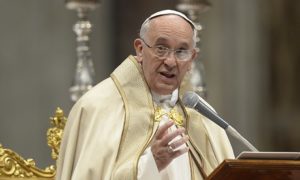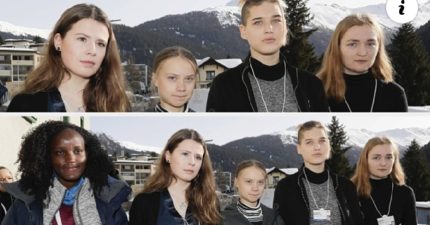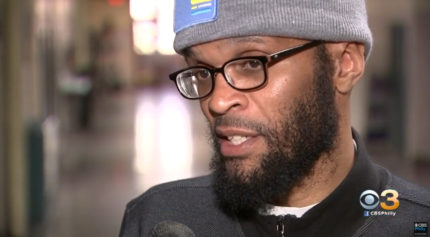
Some observers do not expect the 78-year-old pontiff to invoke the language he used in his Latin America trip, in which he told Bolivian workers that “unfettered capitalism is the dung of the devil.”
“In America, Pope Francis is going to challenge everybody – liberals, conservatives, Republicans and Democrats… he’s going to have uncomfortable messages,” Papal biographer Austen Ivereigh, author of The Great Reformer, Francis and the Making of a Radical Pope told Fox News. “Why? Because he is speaking from the point of view of the poorest and those from the least developed countries and bringing it to the world’s wealthiest nation. So it is going to be tense, but at the same time he’s going to be reaching out beyond all these boundaries of left and right and speak to people’s hearts and minds, which he does better than any politician around.”
During his six-day visit to Washington, D.C., Philadelphia and New York—his first visit to the U.S.—Pope Francis is expected to spark dialogue, and raise contentious issues. For example, the pontiff will address a joint session of Congress, which may be considered hostile territory, given that some conservative lawmakers who dominate the legislature have taken issue with his stance on capitalism and economic exploitation. At least one Republican lawmaker, three-term Rep. Paul Gosar of Arizona is boycotting the speech. Gosar said that as a Roman Catholic, he was at first excited about the pope’s address to Congress, but decided not to attend due to the leader’s “flawed climate change policies” and was appalled by a papal document that “condemned anyone skeptical of the link between human activity and climate change,” as Yahoo News reported.
In a column in Townhall.com, Gosar wrote that he has “a moral obligation and leadership responsibility to call out leaders, regardless of their titles, who ignore Christian persecution and fail to embrace opportunities to advocate for religious freedom and the sanctity of human life.”
He added that if the Pope stuck to standard Christian teachings or spoke out against Islam, “I would be there cheering him on.” Further, the member of Congress wrote that if the Pope “urged the Western nations to rescue persecuted Christians in the Middle East, I would back him wholeheartedly.” Gosar added, “But when the pope chooses to act and talk like a leftist politician, then he can expect to be treated like one.”
Further, the Pope is scheduled to visit a prison during his stay in Philadelphia, specifically the Curran-Fromhold Correctional Facility in the Holmesburg section of the city. A dozen or so inmates have carved a large walnut chair, nearly 6-feet high, which Pope Francis will use during his visit. “At first I thought it was a little strange, honestly, like, why’s he coming to a prison?” Evan Davis, 26, an inmate at the Philadelphia Industrial Correctional Center, told the Philadelphia Inquirer.
Davis, a resident of West Philadelphia and a father of two young girls, has been incarcerated for 2 ½ years, and is awaiting a retrial on third-degree murder charges following a mistrial earlier this year.
“But then you realize, he’s coming to the prison basically to show people everybody in jail is not a criminal. And we need hope now just as much as anybody.”
Meanwhile, it is expected that Pope Francis will address matters of racial justice, in light of the protests in places such as Ferguson, Missouri, following the death of Michael Brown, which helped give birth to the Black Lives Matter movement. There is a sense that the Pope would not come to America without discussing the nation’s most pressing problem. As Terrence McCoy reported in the Washington Post, papal advisers prepared for the pope’s visit by focusing not only on the high-profile killings of Black people by police, but incidents such as a pool party in a Dallas, Texas, suburb this year, in which a white police officer was videotaped wrestling a 14-year-old bikini-clad Black girl to the ground.
Pope Francis, who has condemned U.S. border policy as reflective of “racist and xenophobic attitudes” against immigrants, has not yet weighed in on racial tensions in America. And the Catholic Church, like the U.S., is deeply rooted in racism and slavery.
“It would mean a lot if he used some of his time in the United States to address police brutality and racial injustice,” said writer and activist, Shaun King. “I’d stop short of calling it a wasted trip if he didn’t, but it would be a disappointment.”
In addition, Black Catholics hope that the Pope will acknowledge them, a group which is small in comparison to Latinos in the church, but has been an important part of the fabric of Catholic life. In an op-ed in the Washington Post, University of Pennsylvania professor Anthea Butler wrote that Black Catholics seek recognition.
“For black Catholics, the papal visit is a time of anticipation, but also a time of reflection on their difficult, but important place within the Catholic Church in America,” Butler wrote. “Despite a rich history of black Americans involved in the Catholic Church, invisibility is a big problem for black Catholics in America. I know this personally as (at least) a fourth-generation black Catholic in America. I went to Catholic school and experienced racism firsthand from nuns and priests.”
Butler also noted that Black Catholics have high expectations of this Pope, as “their identities have often been subsumed within a church that is on the one hand attentive to the needs of many cultural groups, while it expects black Catholics to assimilate into larger parishes because of the growth of Latinos and other groups.”

